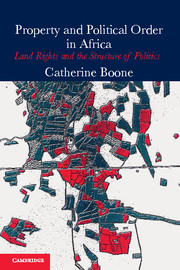Book contents
- Frontmatter
- Dedication
- Contents
- List of Figures, Tables and Maps
- Preface and Acknowledgments
- 1 Introduction
- Part I Property Rights and the Structure of Politics
- Part II
- Part III
- Political Scale
- 6 Land Conflict at the Micro-Scale: Family
- 7 The Local State as an Arena of Redistributive Conflict
- 8 Land Conflict at the National Scale
- Part IV
- Appendix Land Politics Cases and Sources
- References
- Index
7 - The Local State as an Arena of Redistributive Conflict
Chieftaincy
Published online by Cambridge University Press: 05 June 2014
- Frontmatter
- Dedication
- Contents
- List of Figures, Tables and Maps
- Preface and Acknowledgments
- 1 Introduction
- Part I Property Rights and the Structure of Politics
- Part II
- Part III
- Political Scale
- 6 Land Conflict at the Micro-Scale: Family
- 7 The Local State as an Arena of Redistributive Conflict
- 8 Land Conflict at the National Scale
- Part IV
- Appendix Land Politics Cases and Sources
- References
- Index
Summary
What is interesting about the Ghana case is that it is a counterfactual: Ghana has seen extensive local conflict, often linked to questions of traditional chieftaincy and land. But these conflicts have remained localized and have never infected national politics to the point of igniting civil wars like those we have seen in other countries. [What specific elements] in the politics or the structure of the Ghanaian state…have made it possible to isolate the national political sphere from infection by violent conflict at the local level?
(Camara et al. 2007, 14)This chapter focuses on politics at a scale that has been mostly invisible in political science analyses of Africa: the scale of the “local state” constituted by chieftaincy. Our argument is that redistributive conflicts generated in these arenas are tamped down at this level, and this is a result of state-building strategies chosen to produce this very effect. For national political systems as a whole, the effect is to weaken the possibilities for building larger social coalitions, shorten the reach of national institutions, strengthen and reproduce ethnic identity as a political status that individuals are constrained to assume, and diminish the national public sphere.
The analysis in this chapter focuses on land politics in northern Cameroon and the Ashanti Region of Ghana. Variation across these two settings (and across both space and time within each region) provides considerable leverage on the main hypotheses and creates opportunities to refine some aspects of the argument. Chieftaincies in both regions are strong by African standards, corresponding in part to the extensive land-allocation powers of the so-called customary authorities in the most visible of the lamidats of northern Cameroon and in Ghana's Ashanti Region. They define what Mamdani (1996a) calls “local states,” and constitute local public spheres in which membership in these local polities is performed and reproduced. Within these public spheres, populations subject to the land-allocation authority of the neocustomary elites are audiences for the performance of chiefly power.
- Type
- Chapter
- Information
- Property and Political Order in AfricaLand Rights and the Structure of Politics, pp. 200 - 228Publisher: Cambridge University PressPrint publication year: 2014



